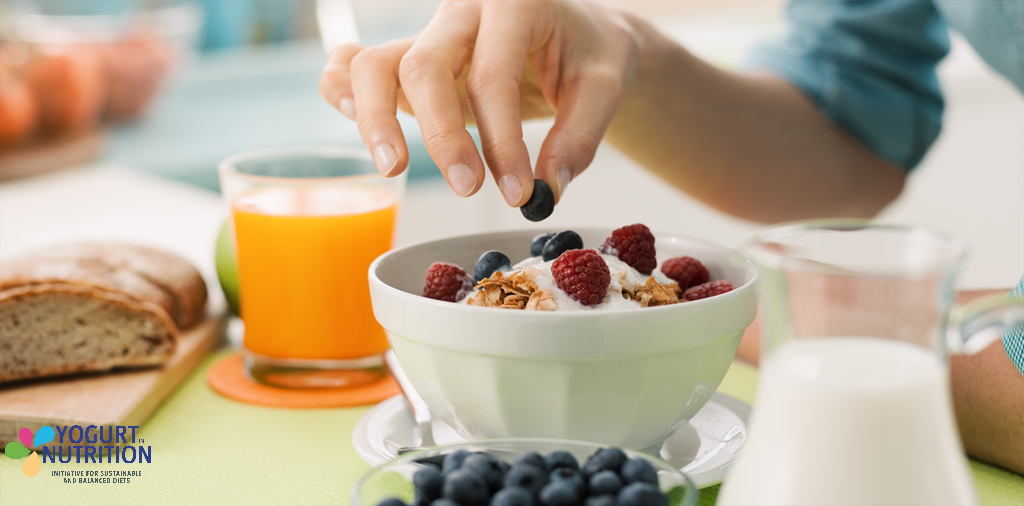Choosing more dairy products and fewer carb-rich foods for breakfast may hold the key to better health, latest research from The Netherlands suggests (1). That’s because swapping out typical carbohydrate-rich breakfast foods in favour of dairy products is associated with healthier metabolism in the hours following the meal – including improved blood glucose control, amino acid availability, and markers of bone health.
Even better, making the switch to dairy products may boost the feeling of fullness after breakfast, the research suggests (1).
The quest for a “perfect” breakfast
Breakfast can make a key contribution to daily recommended intakes of several essential nutrients, and skipping breakfast is associated with an increase in cardiometabolic risk factors and an increased risk of type 2 diabetes and obesity (2,3).
However, the perfect healthy breakfast remains a topic for debate among scientists.
A typical breakfast is high in carbohydrates and low in protein compared with other main meals, the Dutch researchers point out (1). They reason that replacing carbohydrate-rich foods with dairy products may improve the nutrient density of breakfast. In particular, increasing protein and calcium intake through dairy consumption could prove to hold benefits in postprandial metabolism.
Assessing the potential benefits of dairy product at breakfast
With this in mind, the researchers looked at the impact of replacing carbohydrate-rich foods in people’s breakfast with dairy products, by assessing several metabolic indicators immediately after the meal.
Their crossover study involved 20 people who ate a breakfast containing either no dairy, one dairy product, or two dairy products, on three separate days. The breakfasts were matched for energy and fat content, but the breakfasts containing dairy had a higher protein content in place of carbohydrates.
The breakfast types were made up of:
- No dairy product included: three slices of white bread with margarine and strawberry jam, and black tea with sugar
- One dairy product included: three slices of white bread with margarine and strawberry jam, and 250 mL of semi-skimmed cow’s milk
- Two dairy products included: three slices of white bread, 250 mL semi-skimmed cow’s milk, and 35 g of low-fat Gouda cheese. This breakfast represented an intake equivalent to ∼66% of the daily dairy intake recommended by the US Department of Agriculture MyPlate (4).
The researchers measured metabolic responses including amino acids, blood glucose, and markers of bone formation and resorption, before the participants started their breakfast and at set intervals for up to 5 hours after starting.
Breakfast choices influences post-meal metabolic responses
- Results showed that replacing a carbohydrate-rich part of breakfast with dairy increased the availability of amino acids in the blood following the meal – an effect that was emphasised when two dairy products were included in the breakfast.
- The switch to dairy also reduced the peak in blood glucose seen after the meal, along with increased glucagon-like peptide-1 (GLP-1) in the plasma. GLP-1 enhances insulin secretion and inhibits glucagon-release in a glucose-dependent manner. The findings point to improved blood glucose control, and reducing postprandial peaks in blood glucose is a key strategy for reducing risk of cardiovascular complications.
- Compared with a dairy-free breakfast, the inclusion of dairy products in breakfast was also associated with higher calcium levels, mirrored by a greater decline of parathyroid hormone in the plasma (Uselly, the parathyroid hormone is secreted in response to low calcium levels detected in the blood).
- Markers of bone resorption were suppressed during the post-meal period following both dairy-containing breakfasts. Markers of bone formation, on the other hand, did not improve following any of the three breakfasts.
Replacing carbohydrate with dairy foods was associated with improved satiety
The researchers also looked at how well the different breakfast types satisfied hunger. Participants were asked to complete questionnaires before starting, and each hour after starting their breakfast.
Results showed that after two dairy servings, feelings of hunger were lower for longer and the feeling of being full was greater for longer compared with the other two breakfasts.
These findings came as no surprise to the researchers as previous studies have shown dairy consumption to reduce appetite, mainly due to the protein content of dairy and possibly also to its calcium content (5,6,7).
“Iso-energetic replacement of a carbohydrate-rich breakfast component with one serving of dairy improves postprandial amino acid availability, glycemic control, and bone metabolism. Adding a second serving of dairy in lieu of carbohydrates augments postprandial amino acid and GLP-1 concentrations while further promoting satiety.” – Hilkens L, et al., 2024
Additional references
- 2. Ballon A, Neuenschwander M, Schlesinger S. Breakfast Skipping Is Associated with Increased Risk of Type 2 Diabetes among Adults: A Systematic Review and Meta-Analysis of Prospective Cohort Studies. J Nutr. 2019 Jan 1;149(1):106-113. doi: 10.1093/jn/nxy194. PMID: 30418612.
- 3.Ma X, Chen Q, Pu Y, Guo M, Jiang Z, Huang W, Long Y, Xu Y. Skipping breakfast is associated with overweight and obesity: A systematic review and meta-analysis. Obes Res Clin Pract. 2020 Jan-Feb;14(1):1-8. doi: 10.1016/j.orcp.2019.12.002. Epub 2020 Jan 7. PMID: 31918985.
- 4. U.S. Department of Agriculture and U.S. Department of Health and Human Services Dietary Guidelines for Americans (9th Edition) (2020-2025)
- 5. Law M, Lee YT, Vien S, Luhovyy BL, Anderson GH. The effect of dairy products consumed with high glycemic carbohydrate on subjective appetite, food intake, and postprandial glycemia in older adults. Appl Physiol Nutr Metab. 2017 Nov;42(11):1210-1216. doi: 10.1139/apnm-2017-0210. Epub 2017 Jul 31. PMID: 28759735.
- 6. Dove ER, Hodgson JM, Puddey IB, Beilin LJ, Lee YP, Mori TA. Skim milk compared with a fruit drink acutely reduces appetite and energy intake in overweight men and women. Am J Clin Nutr. 2009 Jul;90(1):70-5. doi: 10.3945/ajcn.2008.27411. Epub 2009 May 27. PMID: 19474132.
- 7. Westerterp-Plantenga MS, Lemmens SG, Westerterp KR. Dietary protein – its role in satiety, energetics, weight loss and health. Br J Nutr. 2012 Aug;108 Suppl 2:S105-12. doi: 10.1017/S0007114512002589. PMID: 23107521.



